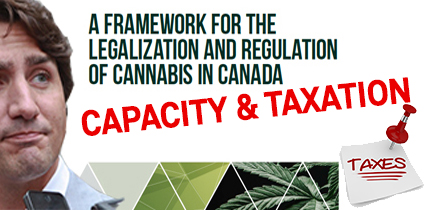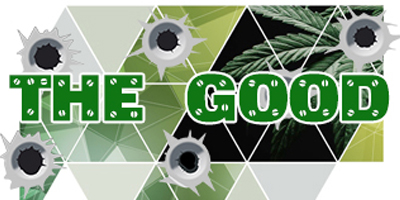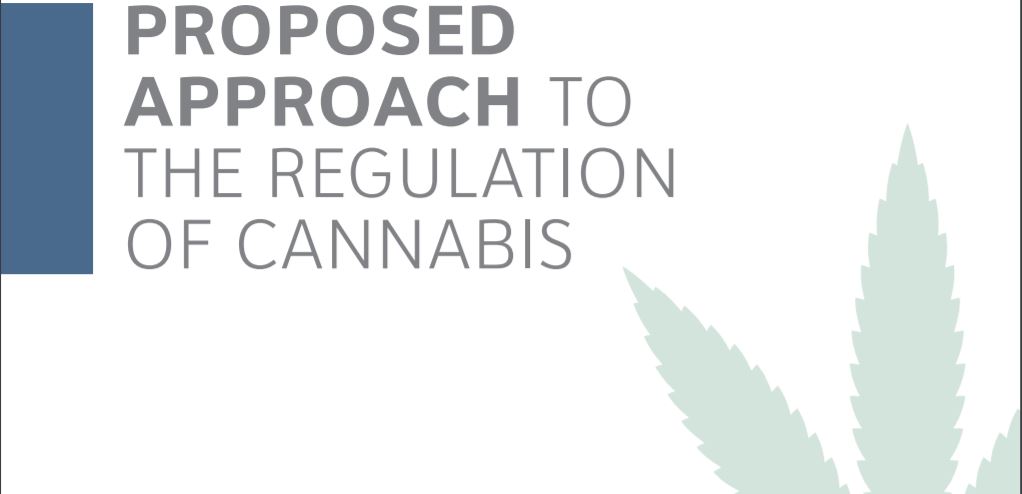(article previously posted at InsidetheJar)
Capacity and Taxation: Tools of Control
Travis Lane
Part four in a series on the task force report.
Many of the problematic recommendations in the report seem to stem from the desire for governmental market control, with a particular focus on influencing the end user.
Where personal carry limits and fear based rhetoric target the public directly, there are two recommendations in the report that could lead to more insidious and manipulative attempts to control the consumer market, particularly if both are adopted.
The first recommendation is that the government use ‘production controls’ in the early stages of regulation. What this means is that the government would be able to manipulate supply by increasing or decreasing the legal licenses available to producers, or the amount that they can produce.
On page 32 the report, in the chapter focused on supply chain management, four advantages to using such production controls are laid out.
Two of these advantages, properly funded oversight and preventing market saturation, are logical. If there is no system for inspections, then the regulations mean nothing. If every farm in the country converted to cannabis tomorrow, food production would be negatively effected.
Another advantage is the ability to make room for small producers, and prevent the conglomeration of production into a few large businesses. This is a great reason to implement some level of production control. Corporate conglomeration represents one of the biggest concerns for small producers that want to be part of the regulated market.
The other advantage listed is:
Controlling cannabis prices by increasing or decreasing the number of production licences issued or by imposing limits on the size of facilities.
This is more than a bit contentious. Do they really believe that the government will be able to react to market influences swiftly enough to effect retail pricing by regulating producers’ future output?

If they do, that is scary. Even if it was possible to quickly shift entire markets in this fashion without feeding the black market, I doubt that the public wants the government to have the ability to force a legal, private business to stop operating because of fluctuations in retail pricing.
If they don’t believe they can have this kind of swift impact on prices, then the government is stuck predicting how much product the market needs, and when. This kind of guessing game is highly likely to lead to shortages and overpriced product on the legal market, which is great news for the black market.
To be fair, the report does address this potential stumbling block:
However, limiting the number of production facilities or the size of those facilities must be balanced against the possible miscalculation of demand that would create opportunities for illicit producers to fill the void.
This whole idea has the appearance of government overreach. The government should not be trying to manipulate pricing and consumer behaviour like this in the first place.
They should simply license enough production to fill demand, with reasonable restrictions and oversight, and let price be determined by the demand.
Besides, if the government wants to influence the sale price, the tried and true method is sales tax. It doesn’t require any divination, and can be applied simply at the point of purchase.
The task force see this, which is where the second control-focused recommendation comes in. It the report, they recommend an oddly targeted tax strategy:
Develop strategies to encourage consumption of less potent cannabis, including a price and tax scheme based on potency to discourage purchase of high-potency products.
There are many places in the report where it mentions the need to eliminate the black market through competition. This recommendation seems to run counter to that viewpoint.
If there is a class of products that are more expensive to purchase, without increased production costs, there will be a black market.
It should be expected that the government will tax cannabis purchasers to discourage use. It happens all the time, in the form of ‘sin’ taxes, oil taxes, and bridge tolls, among others.
This idea of scaling taxation is not usual, however. You don’t pay extra taxes for higher potency alcohol or cleaner gas.
Edibles, hash, and extracted oils should not be treated differently when it comes to regulation. The supreme court agrees with this perspective, and so should anyone concerned with the health impacts of smoking cannabis.
If the decision is made to tax edibles more heavily than flower, people will just buy the source material and make edibles at home. As long as they understand decarboxylation, and don’t cook too hot, they will end up with effective products. They will then share with their friends.

This is what has been happening for decades. It is not dangerous, but it is unregulated. There is no known dosing information, and no enforced quality control. As a result, these will be cheap to make, and cheap to distribute. It might be the most harmless illicit market ever, but I doubt this is the result the task force is hoping for.
As another example, if people can’t buy solvent-based concentrates for a reasonable price, the market for such substances will continue to thrive underground. Instead of driving the consumer to accredited, insured labs that have been purpose-built to handle flammable solvents, they will be forced to buy from people that can not get accreditation or insurance.
In this case, THC-dependent taxes would encourage dangerous practices where safe practices can and do exist.
While this sliding scale taxation may not be an outright ban, market effects on high THC products would be surprisingly similar.
Both of these over-reaching recommendations take elements of regulation and turn them into a convoluted mess. There will be taxes and there will be limited licenses, but these policies should not exist in order to manipulate consumer behaviour.
Trying to dissuade use by increasing retail pricing goes against the idea of eliminating the illicit market. This is acknowledged throughout the report, which is why these two recommendations stand out.
Unfortunately for the report’s sake, a tightly controlled, designer taxed, price fixed ‘free’ market is not only self-contradictory, but doomed to fail.




